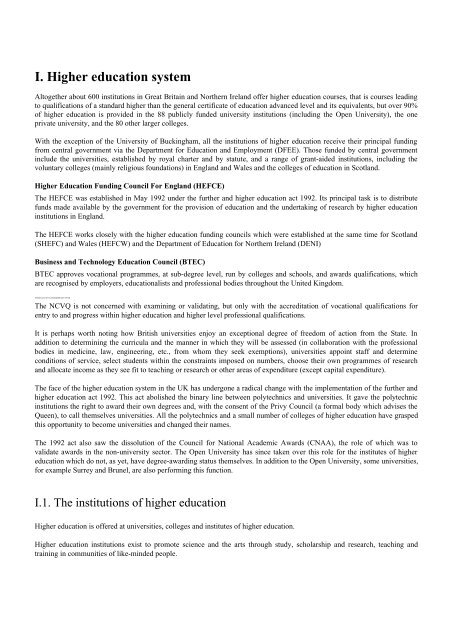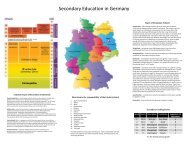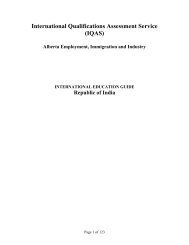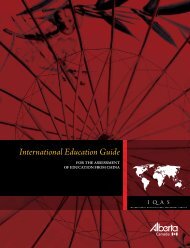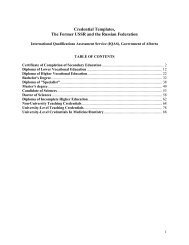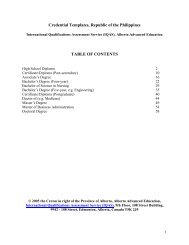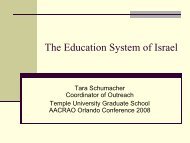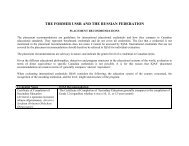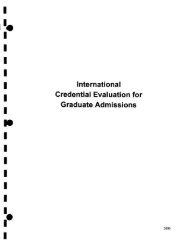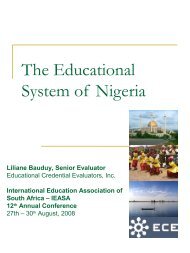NARIC guide on Higher Education Systems in the European Union
NARIC guide on Higher Education Systems in the European Union
NARIC guide on Higher Education Systems in the European Union
Create successful ePaper yourself
Turn your PDF publications into a flip-book with our unique Google optimized e-Paper software.
I. <strong>Higher</strong> educati<strong>on</strong> system<br />
Altoge<strong>the</strong>r about 600 <strong>in</strong>stituti<strong>on</strong>s <strong>in</strong> Great Brita<strong>in</strong> and Nor<strong>the</strong>rn Ireland offer higher educati<strong>on</strong> courses, that is courses lead<strong>in</strong>g<br />
to qualificati<strong>on</strong>s of a standard higher than <strong>the</strong> general certificate of educati<strong>on</strong> advanced level and its equivalents, but over 90%<br />
of higher educati<strong>on</strong> is provided <strong>in</strong> <strong>the</strong> 88 publicly funded university <strong>in</strong>stituti<strong>on</strong>s (<strong>in</strong>clud<strong>in</strong>g <strong>the</strong> Open University), <strong>the</strong> <strong>on</strong>e<br />
private university, and <strong>the</strong> 80 o<strong>the</strong>r larger colleges.<br />
With <strong>the</strong> excepti<strong>on</strong> of <strong>the</strong> University of Buck<strong>in</strong>gham, all <strong>the</strong> <strong>in</strong>stituti<strong>on</strong>s of higher educati<strong>on</strong> receive <strong>the</strong>ir pr<strong>in</strong>cipal fund<strong>in</strong>g<br />
from central government via <strong>the</strong> Department for Educati<strong>on</strong> and Employment (DFEE). Those funded by central government<br />
<strong>in</strong>clude <strong>the</strong> universities, established by royal charter and by statute, and a range of grant-aided <strong>in</strong>stituti<strong>on</strong>s, <strong>in</strong>clud<strong>in</strong>g <strong>the</strong><br />
voluntary colleges (ma<strong>in</strong>ly religious foundati<strong>on</strong>s) <strong>in</strong> England and Wales and <strong>the</strong> colleges of educati<strong>on</strong> <strong>in</strong> Scotland.<br />
<strong>Higher</strong> Educati<strong>on</strong> Fund<strong>in</strong>g Council For England (HEFCE)<br />
The HEFCE was established <strong>in</strong> May 1992 under <strong>the</strong> fur<strong>the</strong>r and higher educati<strong>on</strong> act 1992. Its pr<strong>in</strong>cipal task is to distribute<br />
funds made available by <strong>the</strong> government for <strong>the</strong> provisi<strong>on</strong> of educati<strong>on</strong> and <strong>the</strong> undertak<strong>in</strong>g of research by higher educati<strong>on</strong><br />
<strong>in</strong>stituti<strong>on</strong>s <strong>in</strong> England.<br />
The HEFCE works closely with <strong>the</strong> higher educati<strong>on</strong> fund<strong>in</strong>g councils which were established at <strong>the</strong> same time for Scotland<br />
(SHEFC) and Wales (HEFCW) and <strong>the</strong> Department of Educati<strong>on</strong> for Nor<strong>the</strong>rn Ireland (DENI)<br />
Bus<strong>in</strong>ess and Technology Educati<strong>on</strong> Council (BTEC)<br />
BTEC approves vocati<strong>on</strong>al programmes, at sub-degree level, run by colleges and schools, and awards qualificati<strong>on</strong>s, which<br />
are recognised by employers, educati<strong>on</strong>alists and professi<strong>on</strong>al bodies throughout <strong>the</strong> United K<strong>in</strong>gdom.<br />
Nati<strong>on</strong>al Council for Vocati<strong>on</strong>al Qualificati<strong>on</strong>s (NCVQ)<br />
The NCVQ is not c<strong>on</strong>cerned with exam<strong>in</strong><strong>in</strong>g or validat<strong>in</strong>g, but <strong>on</strong>ly with <strong>the</strong> accreditati<strong>on</strong> of vocati<strong>on</strong>al qualificati<strong>on</strong>s for<br />
entry to and progress with<strong>in</strong> higher educati<strong>on</strong> and higher level professi<strong>on</strong>al qualificati<strong>on</strong>s.<br />
It is perhaps worth not<strong>in</strong>g how British universities enjoy an excepti<strong>on</strong>al degree of freedom of acti<strong>on</strong> from <strong>the</strong> State. In<br />
additi<strong>on</strong> to determ<strong>in</strong><strong>in</strong>g <strong>the</strong> curricula and <strong>the</strong> manner <strong>in</strong> which <strong>the</strong>y will be assessed (<strong>in</strong> collaborati<strong>on</strong> with <strong>the</strong> professi<strong>on</strong>al<br />
bodies <strong>in</strong> medic<strong>in</strong>e, law, eng<strong>in</strong>eer<strong>in</strong>g, etc., from whom <strong>the</strong>y seek exempti<strong>on</strong>s), universities appo<strong>in</strong>t staff and determ<strong>in</strong>e<br />
c<strong>on</strong>diti<strong>on</strong>s of service, select students with<strong>in</strong> <strong>the</strong> c<strong>on</strong>stra<strong>in</strong>ts imposed <strong>on</strong> numbers, choose <strong>the</strong>ir own programmes of research<br />
and allocate <strong>in</strong>come as <strong>the</strong>y see fit to teach<strong>in</strong>g or research or o<strong>the</strong>r areas of expenditure (except capital expenditure).<br />
The face of <strong>the</strong> higher educati<strong>on</strong> system <strong>in</strong> <strong>the</strong> UK has underg<strong>on</strong>e a radical change with <strong>the</strong> implementati<strong>on</strong> of <strong>the</strong> fur<strong>the</strong>r and<br />
higher educati<strong>on</strong> act 1992. This act abolished <strong>the</strong> b<strong>in</strong>ary l<strong>in</strong>e between polytechnics and universities. It gave <strong>the</strong> polytechnic<br />
<strong>in</strong>stituti<strong>on</strong>s <strong>the</strong> right to award <strong>the</strong>ir own degrees and, with <strong>the</strong> c<strong>on</strong>sent of <strong>the</strong> Privy Council (a formal body which advises <strong>the</strong><br />
Queen), to call <strong>the</strong>mselves universities. All <strong>the</strong> polytechnics and a small number of colleges of higher educati<strong>on</strong> have grasped<br />
this opportunity to become universities and changed <strong>the</strong>ir names.<br />
The 1992 act also saw <strong>the</strong> dissoluti<strong>on</strong> of <strong>the</strong> Council for Nati<strong>on</strong>al Academic Awards (CNAA), <strong>the</strong> role of which was to<br />
validate awards <strong>in</strong> <strong>the</strong> n<strong>on</strong>-university sector. The Open University has s<strong>in</strong>ce taken over this role for <strong>the</strong> <strong>in</strong>stitutes of higher<br />
educati<strong>on</strong> which do not, as yet, have degree-award<strong>in</strong>g status <strong>the</strong>mselves. In additi<strong>on</strong> to <strong>the</strong> Open University, some universities,<br />
for example Surrey and Brunel, are also perform<strong>in</strong>g this functi<strong>on</strong>.<br />
I.1. The <strong>in</strong>stituti<strong>on</strong>s of higher educati<strong>on</strong><br />
<strong>Higher</strong> educati<strong>on</strong> is offered at universities, colleges and <strong>in</strong>stitutes of higher educati<strong>on</strong>.<br />
<strong>Higher</strong> educati<strong>on</strong> <strong>in</strong>stituti<strong>on</strong>s exist to promote science and <strong>the</strong> arts through study, scholarship and research, teach<strong>in</strong>g and<br />
tra<strong>in</strong><strong>in</strong>g <strong>in</strong> communities of like-m<strong>in</strong>ded people.


